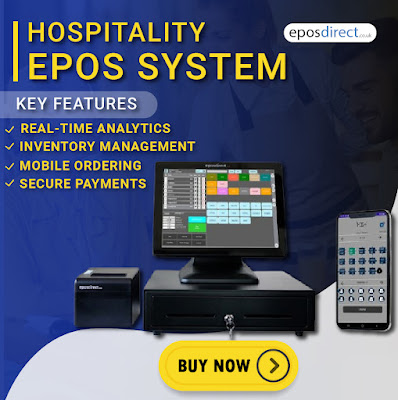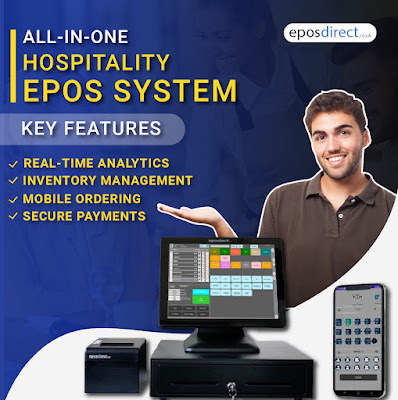In today's fast-paced business environment, retailers and hospitality businesses of all sizes need efficient and intelligent tools to stay ahead of the curve. Enter EPOS (Electronic Point of Sale) systems, a game-changer for managing transactions, inventory, and customer interactions. Whether you're a bustling coffee shop or a boutique clothing store, understanding EPOS systems and their capabilities is key to unlocking operational efficiency and boosting your bottom line.
What is an EPOS System?
An EPOS system for small businesses goes far beyond the traditional cash register. It's a comprehensive software solution that streamlines your entire sales process. Imagine a system that handles everything from processing customer payments (including contactless and mobile wallets) to managing inventory, generating insightful reports, and even facilitating customer loyalty programs. That's the power of an EPOS system.
Benefits for Retailers:
Enhanced Inventory Management: Say goodbye to manual stocktaking and hello to real-time inventory tracking. EPOS systems automatically update stock levels with every sale, allowing you to identify low-stock items and reorder efficiently. This minimizes stockouts, prevents overstocking, and ensures you always have the products your customers demand.
Streamlined Sales Process: EPOS systems eliminate the need for manual calculations and data entry, speeding up checkout times and reducing errors. This translates to shorter queues, happier customers, and increased staff productivity.
Data-Driven Decision Making: EPOS systems generate comprehensive sales reports that provide valuable insights into your business performance. Analyze popular products, track sales trends, and identify peak selling periods. With this data at your fingertips, you can make informed decisions about product selection, pricing strategies, and staffing schedules.
Improved Customer Engagement: Modern EPOS systems for retail can integrate with loyalty programs, allowing you to reward repeat customers and personalize their shopping experience. This fosters customer loyalty and encourages repeat business.
Omnichannel Retailing: EPOS systems can connect your physical store with your online presence. Manage stock across both platforms, streamline online orders, and offer convenient click-and-collect options. This creates a seamless shopping experience for your customers, regardless of their preferred channel.
Benefits for Hospitality Businesses:
Efficient Table Management: EPOS systems for hospitality provide visual floor plans and real-time table status updates. This empowers your staff to efficiently manage reservations, seat guests quickly, and optimize table turnaround times.
Enhanced Menu Management: Easily update menus, track ingredient usage, and manage recipe costing with an EPOS system.
Improved Order Accuracy: With EPOS systems, waiters can send orders directly to the kitchen, reducing errors and ensuring faster service.
Faster Payment Processing: EPOS systems streamline the payment process, allowing customers to settle their bills quickly and conveniently. This avoids delays and keeps service flowing smoothly.
Customer Relationship Management: Capture customer information and preferences within the EPOS system. This allows you to personalize future interactions, offer targeted promotions, and build stronger customer relationships.
Choosing the Right EPOS System:
With a plethora of EPOS systems available, selecting the right one for your business requires careful consideration. Here are some key factors to keep in mind:
Business Needs: Identify your specific requirements. An EPOS system for a small coffee shop will differ from the needs of a large retail chain. Analyze what features are most crucial for your business operations.
Ease of Use: Choose a user-friendly system that your staff can learn and navigate easily. Intuitive interfaces and minimal training requirements are essential for smooth implementation.
Scalability: Consider your growth plans. Opt for an EPOS system that can adapt and evolve alongside your business.
Integration Capabilities: Ensure the EPOS system integrates with existing software like accounting software or online ordering platforms. Seamless data flow optimizes efficiency and eliminates data silos.
Cost: EPOS systems range from affordable cloud-based solutions to more complex on-premise systems. Determine your budget and choose a system that offers the best value for your investment.
Epos Software UK:
For retailers and hospitality businesses in the UK, there's a vibrant market for EPOS software providers. Conduct thorough research to identify reputable vendors that cater specifically to your industry and budget. Look for companies with strong track records, excellent customer support, and features that align with your business needs.
Conclusion
In conclusion, EPOS till systems represent a cornerstone of modern retail and hospitality operations. From simplifying transactions to empowering data-driven decision-making, these systems offer a multitude of benefits for businesses of all sizes. Whether it's an all-in-one EPOS system catering to diverse needs or specialized solutions tailored to specific industries, the key lies in harnessing technology to enhance efficiency and customer satisfaction. As the market continues to evolve, embracing EPOS systems will undoubtedly remain a crucial aspect of success for retailers and hospitality businesses alike.



